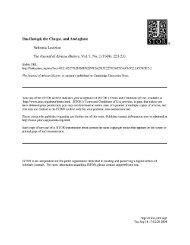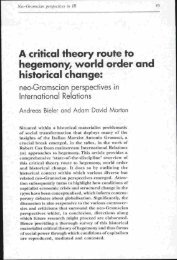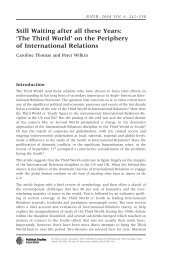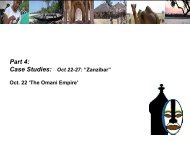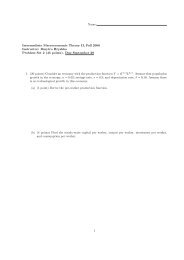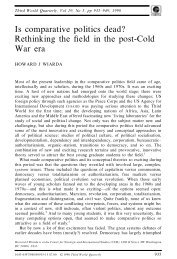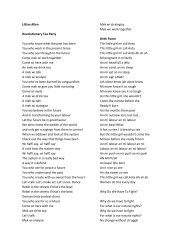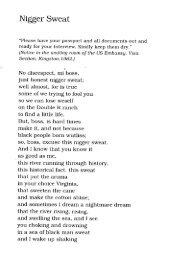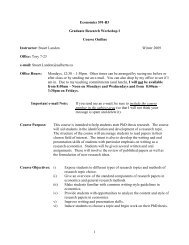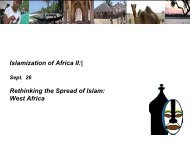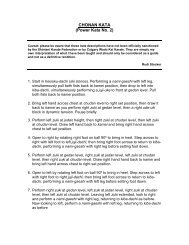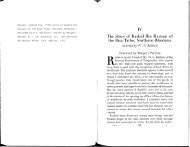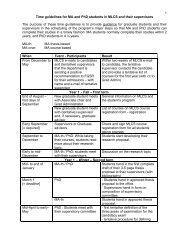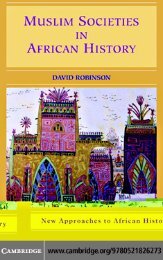personal memories revolutionary states and indian ocean migrations
personal memories revolutionary states and indian ocean migrations
personal memories revolutionary states and indian ocean migrations
You also want an ePaper? Increase the reach of your titles
YUMPU automatically turns print PDFs into web optimized ePapers that Google loves.
23 Heanley, A Memoir of Edward Steere, 250-3.<br />
24 Ibid., 219-20.<br />
25 Ibid., 249.<br />
26 The first work published there was Qamus al-Shari‘a, a 90-volume work by the nineteenth-century<br />
Omani Ibadi scholar, Jumayyil b. Khamis al-Sa‘di, of which the press in Zanzibar published volumes<br />
1-16; vols. 1-21 have been published in Oman. Complete manuscripts of all ninety volumes may be<br />
found in Oman’s Ministry of National Heritage <strong>and</strong> Culture <strong>and</strong> in the private library of Sayyid<br />
Muhammad al-Bu Sa‘idi in Sib, Oman. Barghash’s printing press also published works by Ibadi<br />
scholars of the Mzab valley, Algeria.<br />
27 Heanley, A Memoir of Edward Steere, 87.<br />
28 Letter from Bishop Tozer to the Rev. J. W. Festing, August 25, 1865; Heanley, A Memoir of Edward<br />
Steere, 86.<br />
29 Abdullah Saleh Farsy, Baadhi ya wanavyuoni wa kishafi wa mashariki ya Afrika (Mombasa: n.p., 1972),<br />
originally published in 1944 by Zanzibar’s Education Department as part 2 of Tarehe ya Imam Shafi na<br />
wanavyuoni wa kubwa wa mashariki ya Afrika. R<strong>and</strong>all L. Pouwels translated this as The Shafi‘i ulama of<br />
East Africa, ca. 1830-1970 (Madison: University of Wisconsin African Studies Program, 1989), where<br />
this appears on p. 44.<br />
30 I found Amawi’s book on theology, over 400 pages in length, portions of a poem in praise of the<br />
Prophet, portions of his history of the Bu Sa‘idi dynasty, <strong>and</strong>, most interestingly, portions of his diaries<br />
of two of his journeys in the Rovuma river region on behalf of Sayyid Barghash, in the private library<br />
of Sayyid Muhammad al-Bu Sa‘idi in Sib, Oman. The Dar es Salaam fragments include portions from<br />
some of these same works, as well as a work on Sufism <strong>and</strong> a portion of his Swahili-Arabic dictionary.<br />
I received a photocopy of these fragments from Mwalimu Muhammad Idris Saleh of Zanzibar, some<br />
of them sent to me by Dr. Mohammed Kassem of Brock University in Ontario. I am extremely<br />
grateful for the assistance rendered by all these individuals. A fuller account of Amawi’s life <strong>and</strong> work<br />
can be found in Valerie J. Hoffman, “In His (Arab) Majesty’s Service: The Career of a Somali Scholar<br />
<strong>and</strong> Diplomat in Nineteenth-Century Zanzibar,” The East African Coast in Times of Globalization, ed.<br />
Roman Loimeier <strong>and</strong> Rüdiger Seesemann (Münster, Hamburg, Berlin, Vienna, London: LIT Verlag,<br />
2006).<br />
31 Farsy, Shafi‘i ulama of East Africa, 44.<br />
32 Heanley, A Memoir of Edward Steere, 86. In 1877 he also wrote, “I was once asked by some<br />
Mohammedan doctors to give my sense of the saying that man was made in the image of God, <strong>and</strong><br />
they were quite astonished to find that I did not attribute to God body, parts, <strong>and</strong> passions.” Ibid.,<br />
309. As there is a well-known hadith saying that God created Adam according to His own form, it is<br />
odd that the passage in Genesis should have aroused such surprise <strong>and</strong> consternation.<br />
33 In A H<strong>and</strong>book of the Swahili Language as Spoken at Zanzibar (London: Society for the Promotion of<br />
Christian Knowledge, 1924), vi-vii, Steere <strong>states</strong> that Shaykh ‘Abd al-‘Aziz (al-Amawi) volunteered to<br />
translate the Psalms from Arabic into the best <strong>and</strong> purest Swahili, but Steere “found, before long, that<br />
not only did his numerous avocations prevent any rapid progress, but that his language was too<br />
learned to suit exactly our purpose in making the version; it did not therefore proceed further than the<br />
Sixteenth Psalm. I printed these as at once a memorial of his kindness <strong>and</strong> a specimen of what one of<br />
the most learned men in Zanzibar considers the most classical form of his language.” Aloo Osotsi<br />
Mojola credits Amawi with translating the Gospel of Luke, “The Swahili Bible in East Africa from<br />
1844 to 1996: A Brief Survey with Special Reference to Tanzania,” The Bible in Africa: Transactions,<br />
Trajectories <strong>and</strong> Trends, ed. Gerald O. West <strong>and</strong> Musa W. Dube (Boston, Leiden: E.J. Brill, 2001) 514,<br />
although he did it in cooperation with Rev. R. Lewin Pennell, who is credited with the translation in A.<br />
E. M. Anderson-Morshead, History of the Universities’ Mission to Central Africa, 1859-1896 (London:<br />
Office of the Universities’ Mission to Central Africa, 1897), 66.<br />
34 Chauncy Maples joined the mission on March 18, 1876, during the bishopric of Dr. Edward Steere.<br />
He became Archdeacon of Nyasa, then priest on September 9, 1876. He was consecrated Bishop of<br />
Likoma on June 29, 1895, <strong>and</strong> the Rev. William Moore Richardson was consecrated for Zanzibar. As<br />
Hardinge became head of the British administration in Africa only in July 1895, it must be assumed<br />
that the debate between Maples <strong>and</strong> Amawi took place during Maples’s brief stay in Zanzibar before<br />
he proceeded to take up his bishopric in Likoma. Bishop Maples drowned in a storm on Lake Nyasa<br />
September 2, 1895, on his way to take up his post.<br />
35 Heanley, A Memoir of Edward Steere, 313.<br />
36 Al-Kindi, ‘Abd al-Masih b. Ishaq, Risalat ‘Abdallah b. Isma‘il al-Hashimi ila ‘Abd al-Masih b. Ishaq al-<br />
Kindi yad‘uhu ila ’l-islam, wa risalat ‘Abd al-Masih ila ’l-Hashimi yarudd bi-ha ‘alayhi wa yad‘uhu ila ’l-nasraniyya<br />
[‘Abdallah b. Isma‘il al-Hashimi’s letter to ‘Abd al-Masih b. Ishaq al-Kindi calling him to Islam, <strong>and</strong><br />
‘Abd al-Masih’s letter to al-Hashimi in which he responds to him <strong>and</strong> calls him to Christianity], 2 nd ed.<br />
Vol. 5, Fall 2005, © 2005 The MIT Electronic Journal of Middle East Studies<br />
74



